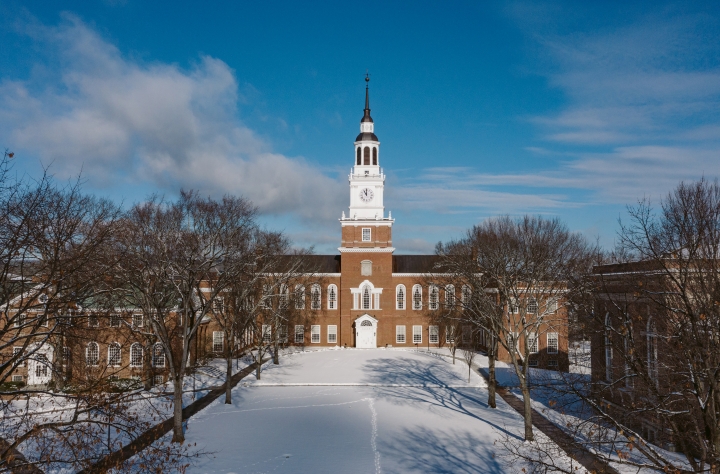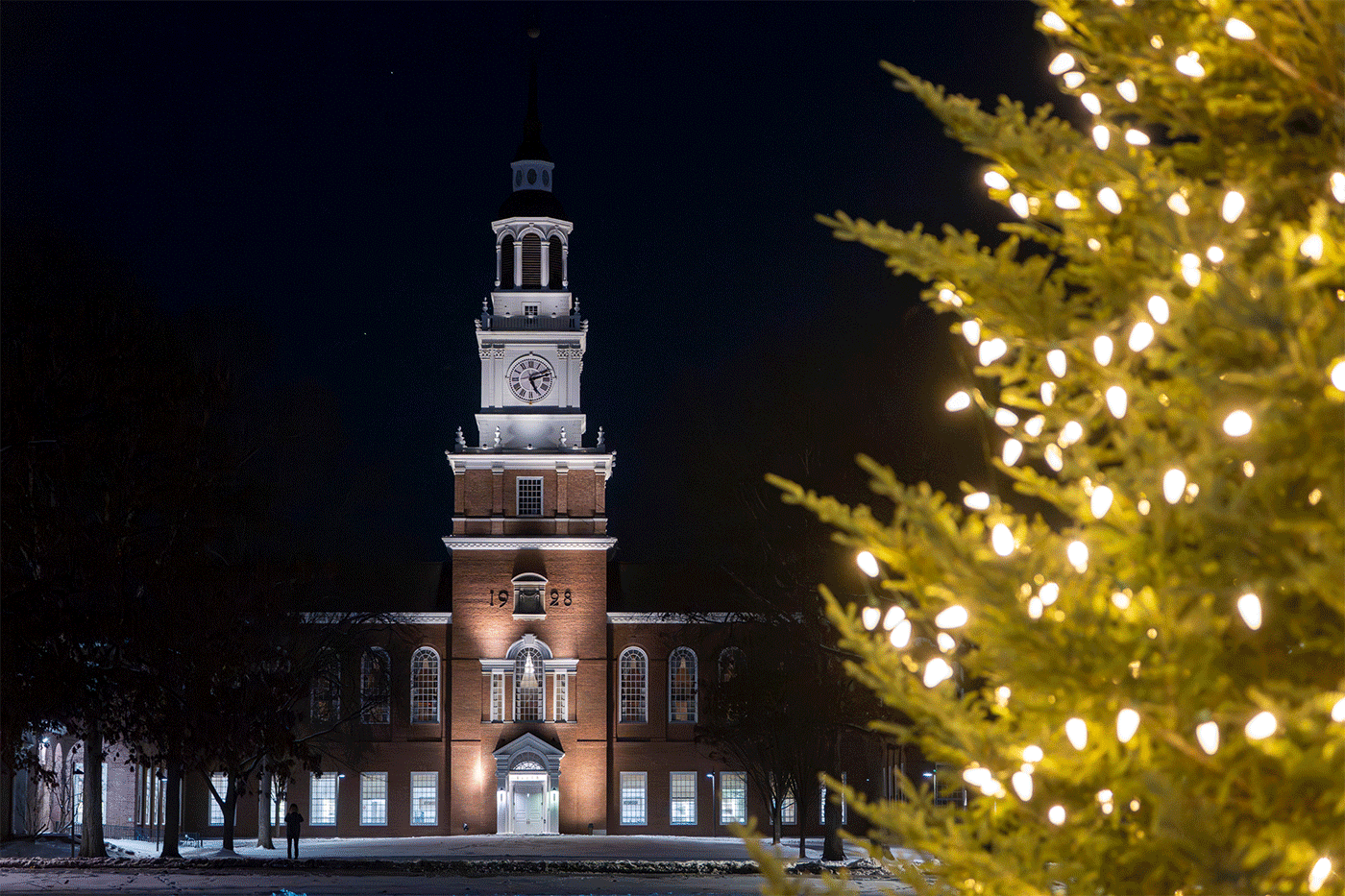Dartmouth today announced that it is expanding its longstanding need-blind admissions policy to include international students, an achievement that will further strengthen Dartmouth’s ability to enroll talented undergraduates from across the globe.
Dartmouth becomes one of only six institutions of U.S. higher education—joining Harvard, Princeton, Yale, MIT, and Amherst—to offer need-blind admissions to all undergraduate applicants while meeting 100% of demonstrated need regardless of citizenship.
This significant change in undergraduate admissions policy, effective immediately for applicants to the Class of 2026, underscores Dartmouth’s standing as a global teaching and research university. The change also makes an international, socioeconomically diverse community more accessible to all Dartmouth students, regardless of their country of origin.
A $40 million gift to The Call to Lead campaign from an anonymous donor—the single largest scholarship gift in Dartmouth’s 253-year history—capped this remarkable achievement. Dartmouth President Philip J. Hanlon ’77 thanked the anonymous benefactor when announcing the admissions change at a virtual event for students, faculty, staff, and alumni.
“In a time when many of humankind’s most difficult challenges know no borders, we are proud to be a magnet for undergraduate talent regardless of citizenship and regardless of a student’s ability to pay,” says President Hanlon. “On behalf of the international students who apply to Dartmouth today—and who will lead in the world tomorrow—I want to thank the incredibly generous lead donor and everyone who has enabled us to adopt universal need-blind admissions.”
Interim Provost David Kotz ’86 says the universal need-blind admissions policy will benefit the entire campus community.
“International students bring an incredible mix of perspectives and life experiences,” he says. “They enrich classroom discussions as well as casual conversations in the library, the lab, on the sidelines of a game, or in the dining hall.”
Dartmouth set a $90 million fundraising target at the beginning of the campaign to extend need-blind admissions to international students, an ambitious undertaking launched with a gift from Dorothy and Robert King ’57 to establish the King Scholars Program. More than 440 alumni and parents on six continents made this change in admissions policy possible through their generosity. The strategic aspiration has been endorsed by Dartmouth’s Presidential Commission on Financial Aid.
“Students across the world are hungry for the opportunity of a Dartmouth education,” says Jane Novak ’92, a campaign leader based in London. “Those of us in the international alumni community believe that no single act by Dartmouth could ignite more new interest and global awareness than this decision announced today. This bold investment enables Dartmouth to take its rightful place as a leading global institution.”
With today’s announcement, the College now employs the same procedures to evaluate international applicants as it already uses when considering applications from U.S. citizens and permanent residents. For international applicants, from Oslo to Lima, London to Mumbai, financial need will not be a factor in the undergraduate admissions decision-making process. The new policy has no impact on aid eligibility nor the amount of aid any admitted student is offered.
Adopting a universal need-blind admissions policy is one component of the institution’s $500 million plan to expand educational opportunity through financial aid and position Dartmouth at the forefront of global institutions committed to access for low- and middle-income students.
With nearly $372 million in commitments to date, Dartmouth has eliminated student loans for families earning $125,000 or less; waived the family contribution entirely for families earning $65,000 or less; and ensured that all students have the necessary scholarship support to participate in off-campus and international study programs, such as terms abroad. During the past academic year, Dartmouth awarded a total of more than $102 million in financial aid, 59% of that provided through the endowment.
Full and Equal Members
“This exciting announcement will ricochet around the planet,” says Lee Coffin, vice provost for enrollment and dean of admissions and financial aid. “Our expanded need-blind policy reassures any applicant regardless of citizenship for whom affordability is a question that financial need won’t be a factor in the admissions outcome—and as always, Dartmouth will meet 100% of demonstrated need for every accepted student.”
Coffin says adopting universal need-blind admissions amplifies Dartmouth’s commitment to global diversity, equity, and inclusion and advances Dartmouth’s mission to prepare students for lives of wise leadership.
“The students who are enrolling today will have lives and careers that stretch to the 2070s and beyond. We are living in the most international moment in human history, and we’re announcing to the world through this new policy that international citizens are full and equal members of our applicant pool and ultimately of our student body,” says Coffin. “The enhancements to our admissions policies made possible by the campaign mean we are now well-positioned in the most competitive of global admissions conversations.”
For current students and alumni who came to Dartmouth from outside the U.S., scholarship support has been transformative.
“Financial aid was a massive factor in my decision to enroll at Dartmouth,” says Syed Rakin Ahmed ’18, MED ’22, who is completing a dual MD-PhD program offered jointly by Harvard, MIT, and the Geisel School of Medicine. “Growing up in a low-income community in Dhaka, Bangladesh, I never even imagined that I would be where I am today, to be able to receive my undergraduate degree at Dartmouth, to study at the University of Oxford, and now earn a joint degree from Harvard, MIT, and Dartmouth. I consider myself tremendously fortunate.”
Sonia Qin ’19, who was born in Beijing, grew up in Ottawa, Canada, and now is a third-year student at Yale Law School, says a robust financial aid program for non-U.S. students is essential for Dartmouth to fulfill its mission. “For a school that is preparing future leaders,” she says, “you need to have viewpoints that are maybe different, maybe uncomfortable, maybe unusual.”
A Global Ivy
Hanlon’s strategic vision for Dartmouth, which is driving the campaign, has inspired significant investment in the institution’s global engagement and impact—reflected in an increasingly international student body and in the outcomes of Dartmouth’s teaching and research.
Multiple campaign-funded initiatives are fueling Dartmouth’s positive international impact. They include far-reaching interdisciplinary institutes focused on major global challenges, such as the Arthur L. Irving Institute for Energy and Society; the 10 interdisciplinary Academic Cluster faculty teams; and outward-looking graduate school initiatives, such as the Tuck School of Business TuckGO program.
“We are dedicated to making this change responsibly,” says President Hanlon. “Our community has worked hard to realize this aspiration. We are fortunate that their generous support and our strong financials provide us with this exceptional opportunity to signal Dartmouth’s open doors to the next generation worldwide.”
Interest in Dartmouth has grown dramatically from non-U.S. applicants. In the five years leading up to the admissions cycle for the Class of 2026, the pool of international applicants increased by 79%, from 3,555 to 6,373.
The number of enrolled international students has also grown. Foreign citizens represent 14% of the current first-year class, up from 8% in the class that enrolled in 2016, and students from 85 nations are receiving scholarship aid.
The Entire Campus Community Benefits
As a leader in study-abroad programming, Dartmouth has long sought to provide immersive cultural experiences by offering terms abroad for students; typically, more than 55% of all Dartmouth undergraduates study internationally for at least one term.
Diversifying the campus community is another means to expand students’ global awareness, as international students offer a mix of insights.
“One huge benefit of having international students in the room is that they bring a broader range of experiences to any discussion,” says Charles Wheelan ’88, a senior lecturer and policy fellow at the Nelson A. Rockefeller Center for Public Policy. “That may be life under a different kind of political system, or experience with a different kind of schooling, or having been treated in a different health care system, or any other lived experience that is beyond what someone raised in this country can fully appreciate.”
See the video of President Hanlon’s announcement of the new need-blind international admissions policy on Community Conversations.
Find answers regarding Dartmouth’s announcement in these frequently asked questions.


